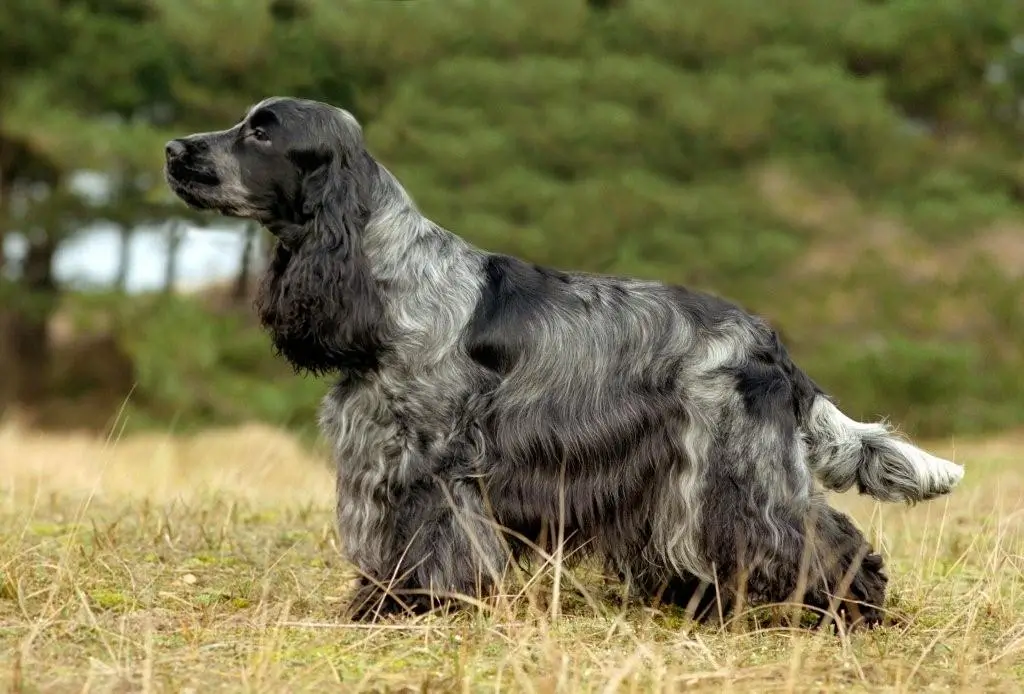While you might associate the Cocker Spaniel with its soulful eyes and luscious coat, you may not know that this breed’s historical prowess belies its gentle demeanor.
Originating as a hunting dog, the Cocker Spaniel’s keen sense of smell and unstoppable zeal for game birds shaped its early heritage—a far cry from the family-friendly companion we know today.
You’re probably familiar with their reputation for warmth and sociability, but there’s a depth to this breed’s nature and needs that often goes unnoticed.
As you consider the Cocker Spaniel’s place in your home or simply seek to understand them better, remember that beyond their amiable facade lies a tapestry of traits and care requirements that could influence your decision to welcome one into your life.
- Noise Level
- Energy
- Sociability
- Trainability
- Care
- Health
Overall
Summary
The Cocker Spaniel is known for its moderate noise level, high energy, exceptional sociability, moderate trainability, moderate care needs, and relatively good health.
Cocker Spaniel: Traits, Temperament, and Care Guide
Cocker Spaniels are friendly and adaptable, making them suitable for various households. However, they require diligent grooming and consistent exercise to maintain their health and happiness.
Whether caring for an American Cocker Spaniel or an English Cocker Spaniel, regular use of high-quality dog shampoo and positive reinforcement during training are crucial.
It is important to note that Cocker Spaniels can develop progressive retinal atrophy, necessitating attentive health management.
Exploring the Characteristics of the Cocker Spaniel
Delving into the characteristics of Cocker Spaniels, you’ll find they are medium-sized canines known for their expressive eyes and luxurious coat, embodying a balance of playfulness and placidity that appeals to families and individuals alike.
| Trait | American Spaniel | English Spaniel |
|---|---|---|
| Size | Medium, up to 28 pounds | Medium, slightly larger |
| Ears | Long, floppy | Floppy, less pendulous |
| Nature | Friendly, eager to please | Friendly, hunting heritage |
Cocker Spaniels make exceptional companions, merging a family pet’s friendly nature with traditional hunting dogs’ instincts.
Cocker Spaniel: A Comprehensive Profile and Guide
You’re about to explore the Cocker Spaniel, a breed with a rich history and charming characteristics.
This guide will provide essential information on their physical traits, temperament, and care requirements.
Understanding these aspects is crucial for any potential owner or enthusiast seeking to ensure the well-being of these friendly canines.
Everything You Need to Know
Why consider a Cocker Spaniel as your next canine companion? This comprehensive guide provides an in-depth breed profile, covering everything from physical characteristics to temperament and health considerations.
- Spaniels enjoy companionship, thriving in a loving family.
- One of the first breeds recognized by the AKC.
- Tailored for hunting the woodcock, showcasing agility and intelligence.
- Require consistent grooming for their luscious coats.
- Prone to specific health issues, emphasizing the need for attentive care.
Discovering the Temperament
When exploring the temperament of the Cocker Spaniel, you’ll find they’re gentle and affectionate companions, known for their lively and easy-going nature.
They make great family pets, being easy to train as companion and therapy dogs.
While they tend to bark, it’s often a sign of their alertness rather than aggression.
Their need for belonging makes them ideal for active, loving homes.

Cocker Spaniel: Is It a Good Fit for Families?
Considering a Cocker Spaniel as a family pet?
Due to their affectionate nature, they’re typically gentle with children and thrive in a family environment.
Their need for regular grooming and companionship means they’re best suited for families ready to invest time in both care and interaction.
Assessing Cocker Spaniel’s Compatibility with Families and Kids
Cocker Spaniels often make excellent family pets due to their gentle and affectionate nature, which typically aligns well with the dynamics of a household with children. They provide non-aggressive companionship and are adaptable to family activities. Cocker Spaniels require regular grooming to prevent health issues but respond well to proper training. They also thrive with plenty of exercise to enjoy a good quality of life. Cocker Spaniels make great family pets with these traits and promote a sense of belonging.
Cocker Spaniel Flexibility
Their adaptability to different living environments and activities makes Cocker Spaniels a versatile breed for city dwellers and outdoor enthusiasts.
As descendants of hunting dog breeds, they excel in agility courses and thrive as working Cockers.
When integrated as family pets, their need for belonging is met.
However, be mindful of their grooming needs to prevent ear infections, a common health concern.
Cocker Spaniel Obedience Tips
You’ll find that your Cocker Spaniel’s intelligence and desire to please make them highly responsive to obedience training.
It’s essential to begin training early, utilizing positive reinforcement to build a strong foundation of good behavior.
Incorporating mental and physical activities like interactive play will keep them engaged and facilitate their learning process.
Effective Training Strategies
Implementing positive reinforcement and reward-based techniques can significantly enhance the training process for Cocker Spaniels, ensuring they learn obedience commands joyfully and effectively. As pet parents, you’re part of a community where spaniels are among the most cherished companions. Use a high-quality dog treat to motivate your dog during potty training and other effective training strategies.
| Positive Action | Emotional Response |
|---|---|
| Potty Training Success | Pride and Joy |
| Mastering Commands | Bonding and Trust |
| Interactive Play | Shared Happiness |
Exercise and Grooming Needs
Cocker Spaniels require at least 30 minutes of walking twice daily and free playtime to satisfy their exercise needs and support mental well-being. Their hunting lineage necessitates active engagement.
Grooming is vital; using a dog comb three times a week prevents tangles. Nails should be trimmed regularly, and the dog’s ears need careful attention to avoid infections.
These practices promote health and foster a sense of companionship.

Health Considerations
When considering a Cocker Spaniel’s health, you’ll need to monitor for ear infections and skin conditions, which are prevalent due to their floppy ears and dense coat.
Additionally, genetic predispositions mean regular vet check-ups are vital to catch and manage conditions like hip dysplasia and eye disorders early on.
Common Health Issues and Lifespan
Understanding the common health issues and lifespan of Cocker Spaniels is crucial for owners to ensure these friendly dogs live a full and healthy life. Conditions Cocker Spaniels face include eye problems like cataracts, which can lead to night blindness, and joint issues that may lead to arthritis. It’s important to keep an eye on their weight and ear health.
They typically enjoy a lifespan of 12 to 15 years with proper care.
Alternatives for Cocker Spaniel: Charming and Sociable Breeds
If the Cocker Spaniel’s charm and sociability win your heart, consider these breeds that offer similar qualities of warmth, friendliness, and versatility.
| Similar Dogs | Short Description |
|---|---|
| English Springer Spaniel | Energetic and affectionate, great for active families and various dog sports |
| Golden Retriever | A friendly and intelligent breed, known for its gentle nature and adaptability. |
| Labrador Retriever | Popular for its friendly demeanor and strong desire to please. |
| Brittany | An enthusiastic and agile breed, excellent in hunting and as a family companion. |
| American Cocker Spaniel | A smaller spaniel, known for its sweet temperament and luxurious coat. |
Is Cocker Spaniel the Right Pet for You?
Determining whether a Cocker Spaniel aligns with your lifestyle and expectations is crucial before committing to bring one into your home. As the American Spaniel Club suggests, this small dog breed thrives on companionship and shouldn’t be left alone frequently.
Their need for grooming and exercise makes them a full-time commitment, but they’ll eagerly become a loving part of the family.
Conclusion
As you journey through the forest of companionship, envision the Cocker Spaniel as your loyal woodland guide. With its silky coat flowing like a gentle stream, this breed offers a cascade of affection and harmony.
Tread the path of care with exercise and grooming as your map and compass, and stay vigilant in the thicket of health.
Choose this breed, and you’ll walk with a friend whose spirit mirrors the forest’s serene beauty—ever present and graciously intertwined with the tapestry of family life.
Frequently Asked Questions
What Is the Nature of a Cocker Spaniel?
You’ll find Cocker Spaniels intelligent, yet they face training challenges. Their grooming needs and exercise requirements are high. Be mindful of health concerns as they seek your companionship and fit well into your life.
Are Cocker Spaniels Good Natured Dogs?
Yes, Cocker Spaniels are indeed good-natured dogs. They’re known for their gentle disposition, affectionate behavior, and Cocker loyalty. As playful companions, they’re social butterflies, creating a sense of belonging with their warm, friendly presence.
What Is the Demeanor of a Cocker Spaniel?
Cocker Spaniels exhibit high sociability with an affectionate demeanor. They thrive with consistent training despite challenges. Your dog’s exercise needs are significant, grooming requirements are demanding, and health considerations should be carefully monitored.
Which Spaniel Has the Best Temperament?
You’re seeking the sweetest spaniel, so consider breed suitability and socialization importance. Spaniel comparisons show varied temperaments; training responsiveness and exercise needs also factor in, ensuring a perfect, personality-matched pet pal.
